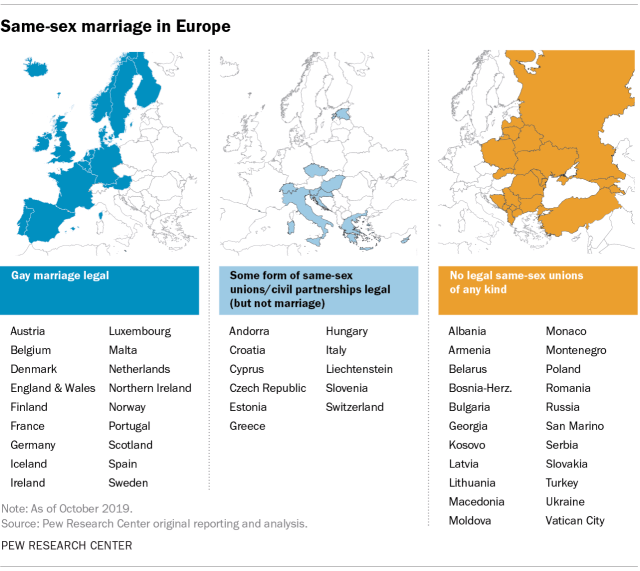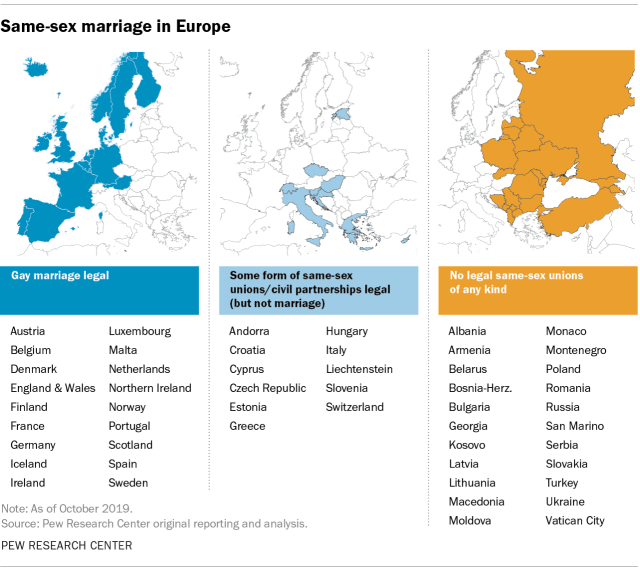
 More than 18 years after the Netherlands became the world’s first country to legalize same-sex marriage, Northern Ireland has become the latest European jurisdiction to allow gays and lesbians to marry. Although Northern Island is a constituent of the United Kingdom, with its own parliament at Stormont, the change in its marriage laws ultimately came about due to action by the UK Parliament in London. British lawmakers justified the change (which was accompanied by the legalization of abortion) because the Northern Irish parliament was suspended in January 2017 amid a stalemate between Northern Ireland’s parties.
More than 18 years after the Netherlands became the world’s first country to legalize same-sex marriage, Northern Ireland has become the latest European jurisdiction to allow gays and lesbians to marry. Although Northern Island is a constituent of the United Kingdom, with its own parliament at Stormont, the change in its marriage laws ultimately came about due to action by the UK Parliament in London. British lawmakers justified the change (which was accompanied by the legalization of abortion) because the Northern Irish parliament was suspended in January 2017 amid a stalemate between Northern Ireland’s parties.
Northern Ireland is the 18th European jurisdiction to legalize gay marriage. This number counts England and Wales together and Scotland and Northern Ireland as separate entities, since same-sex marriage became legal in the UK due to the enactment of three different pieces of legislation: first in England and Wales in 2013, then in Scotland the following year, and now in Northern Ireland.
Same-sex marriage is now legal across the vast majority of Western Europe. One prominent exception is Italy, which has historical ties to the Roman Catholic Church. In spite of these ties, Italy began recognizing same-sex civil unions in 2016. Switzerland also offers same-sex couples the option of civil unions, but not full marriage.
Majorities of adults in all 15 countries in Western Europe surveyed by Pew Research Center in 2017 support same-sex marriage, including roughly six-in-ten Italians and three-quarters of Swiss adults. Support is even higher in Sweden (88%), Denmark (86%) and the Netherlands (86%).
By contrast, people in Central and Eastern Europe are broadly opposed to the practice. Just 5% of Russians and 9% of Ukrainians, for example, say they favor allowing same-sex marriage, according to surveys conducted in 2015 and 2016. Figures in Poland (32%) and Hungary (27%) are higher, though Poles and Hungarians who support same-sex marriage remain in the minority. The Czech Republic is the only country out of 19 surveyed in Central and Eastern Europe where a majority of adults (65%) support gay marriage.
Likewise, no country in Central or Eastern Europe – not even the Czech Republic – allows same-sex couples to legally marry. However, the Czech Republic, along with Croatia, Estonia, Hungary and several other countries in the region, does allow civil unions. Greece joined this list in late 2015 when it agreed to begin recognizing same-sex civil partnerships despite opposition from the Greek Orthodox Church. Slovenia also allows civil unions, but its voters rejected a 2015 referendum that would have legalized full same-sex marriage. (Ireland, on the other hand, became the world’s first country to approve same-sex marriage by popular vote in 2015.)
More than half of the entities around the world that allow same-sex marriage are in Europe, though Taiwan recently become the first Asian jurisdiction to join the list.
Note: This is an update of a post originally published June 9, 2015.

